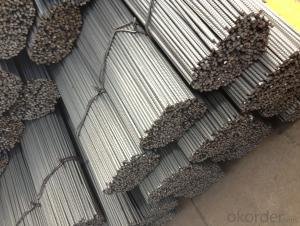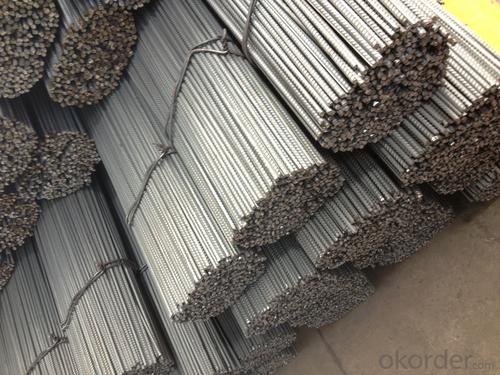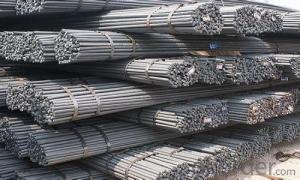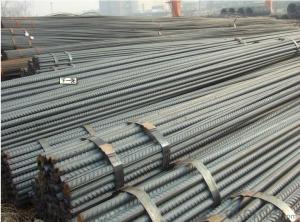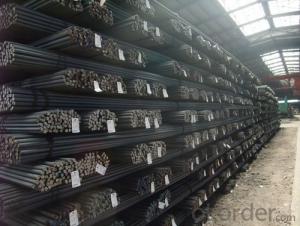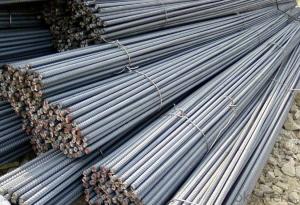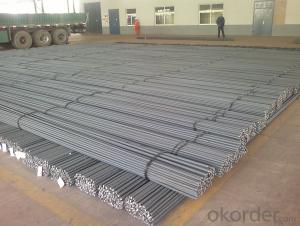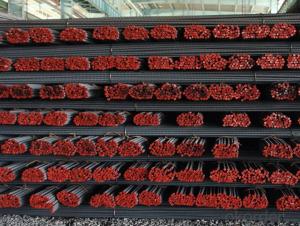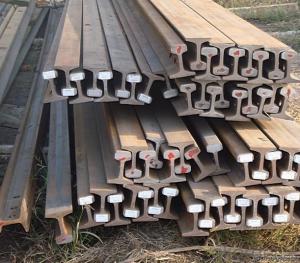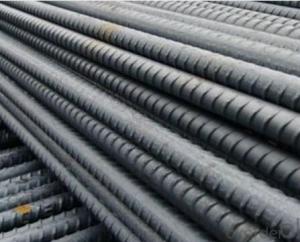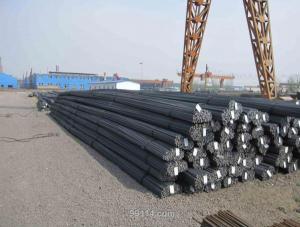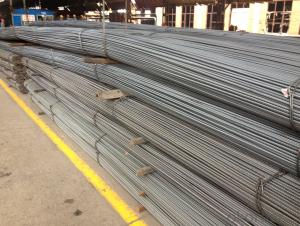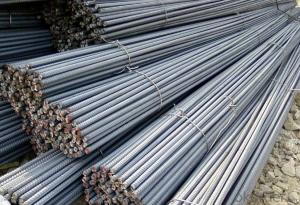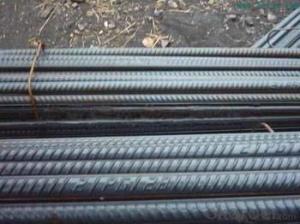Hot Rolled Steel Rebars GB standard
- Loading Port:
- China Main Port
- Payment Terms:
- TT or LC
- Min Order Qty:
- 100 m.t.
- Supply Capability:
- 10000 m.t./month
OKorder Service Pledge
OKorder Financial Service
You Might Also Like
Product Description:
OKorder is offering Hot Rolled Steel Rebars GB standard at great prices with worldwide shipping. Our supplier is a world-class manufacturer of steel, with our products utilized the world over. OKorder annually supplies products to African, South American and Asian markets. We provide quotations within 24 hours of receiving an inquiry and guarantee competitive prices.
Product Applications:
Hot Rolled Steel Rebars GB standard are ideal for structural applications and are widely used in forest region, Mines, factories and construction sites laid of the place such as temporary transport line and light motorcycles with line..
Product Advantages:
OKorder's Hot Rolled Steel Rebars GB standard are durable, strong, and wide variety of sizes.
Main Product Features:
· Premium quality
· Prompt delivery & seaworthy packing (30 days after receiving deposit)
· Can be recycled and reused
· Mill test certification
· Professional Service
· Competitive pricing
Product Specifications:
Manufacture: Hot rolled
Grade: HRB335,HRB400,HRB500
Certificates: ISO, SGS, BV, CIQ
Diameter:10mm-32mm
Packing: products are packed in coils and shipped by break bulk or containers
Grade | Technical data of the original chemical composition (%) | |||||||
C | Mn | Si | S | P | B | |||
HRB335 | ≤0.25 | ≤1.60 | ≤0.80 | ≤0.045 | ≤0.045 | >0.0008 | ||
Physics capability | ||||||||
Yield Strength(N/cm2) | Tensile Strength(N/cm2) | Elongation (%) | ||||||
≥335 | ≥490 | ≥16 | ||||||
Grade | Technical data of the original chemical composition (%) | |||||||
C | Mn | Si | S | P | V | |||
HRB400 | ≤0.25 | ≤1.60 | ≤0.80 | ≤0.045 | ≤0.045 | 0.04-0.12 | ||
Physics capability | ||||||||
Yield Strength(N/cm2) | Tensile Strength(N/cm2) | Elongation (%) | ||||||
≥400 | ≥570 | ≥14 | ||||||
FAQ:
Q1: How many tons of steel products could be loaded in containers?
A1: Usually the steel products are delivered by bulk vessel because of the large quantity and the freight. However, there are no bulk vessel enter some seaports so that we have to deliver the cargo by containers. The 6m steel product can be loaded in 20FT container, but the quantity is changed according to the size, usually from 18tons to 25tons.
Q2: How do we guarantee the quality of our products?
A2: We have established an advanced quality management system which conducts strict quality tests at every step, from raw materials to the final product. At the same time, we provide extensive follow-up service assurances as required.
Q3: How soon can we receive the product after purchase?
A3: Within three days of placing an order, we will arrange production. The normal sizes with the normal grade can be produced within one month. The specific shipping date is dependent upon international and government factors, the delivery to international main port about 45-60days.
Images:
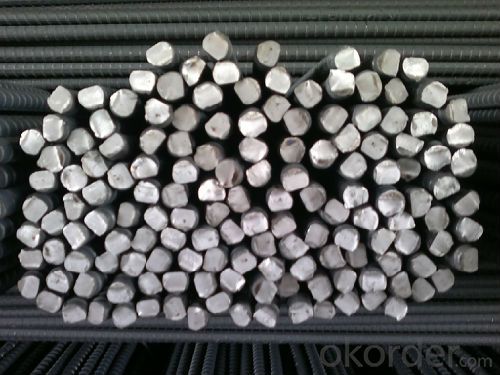
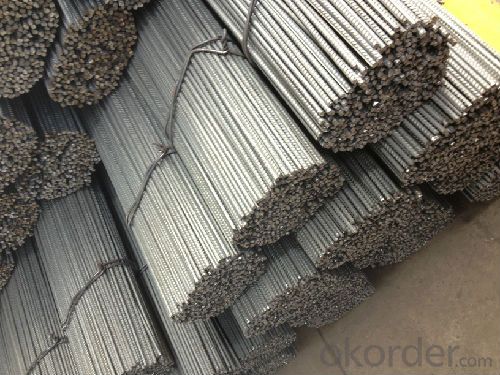
- Q: What is the effect of welding defects on the performance of steel rebars?
- The performance of steel rebars can be significantly affected by welding defects, which can weaken their structural integrity and compromise the overall strength and durability of the construction project. Porosity is one of the common welding defects, caused by the presence of gas pockets or voids in the weld. This weakens the weld joint, reducing its load-bearing capacity and making it more prone to cracking or breaking under stress. As a result, the rebars may not be able to resist external forces, such as the weight of the structure or seismic activities, potentially leading to collapse or structural failure. Another welding defect is lack of fusion, which happens when there is insufficient bonding between the base metal and the weld metal. This creates a weak joint that can easily separate or crack under load. Lack of fusion can decrease mechanical strength and compromise structural performance as the rebars may not be able to withstand the expected load or forces. Additionally, the presence of weld spatter or excessive weld reinforcement can also have a negative impact on the performance of steel rebars. Weld spatter refers to undesirable splashes or droplets of molten metal that can stick to the rebar's surface, creating potential weak points. Excessive weld reinforcement adds unnecessary weight to the rebar and creates stress concentrations, further increasing the risk of failure. In conclusion, welding defects can significantly affect the performance of steel rebars by weakening their structural integrity, reducing load-bearing capacity, and increasing the likelihood of cracking or breaking under stress. Therefore, it is crucial to implement proper welding techniques and quality control measures to minimize or eliminate these defects and ensure the safety and reliability of the construction project.
- Q: Can steel rebars be used in composite structures?
- Yes, steel rebars can be used in composite structures. Steel rebars are often used as reinforcement in composite structures such as concrete-filled steel tubes or fiber-reinforced polymer composites. They provide additional strength and stability to the overall structure, making it more durable and resistant to various loads and stresses.
- Q: Can steel rebars be used in the construction of sports stadiums or arenas?
- Yes, steel rebars can be used in the construction of sports stadiums or arenas. Steel rebars are a commonly used reinforcement material in concrete structures, including stadiums and arenas. They provide strength, durability, and structural integrity to the concrete, making them suitable for the demanding requirements of sports facilities.
- Q: Are there any health and safety concerns related to steel rebars?
- There are multiple health and safety issues associated with steel rebars. Initially, the handling and lifting of these rebars can result in musculoskeletal injuries like strains, sprains, and back problems. Due to their weight, these rebars often require manual handling or the utilization of heavy machinery, thereby increasing the chances of accidents and injuries. Moreover, steel rebars are frequently coated with chemicals for corrosion prevention. These coatings may contain harmful substances such as toxic metals or volatile organic compounds (VOCs). Exposure to these chemicals, either through inhaling fumes or direct skin contact, can lead to various health problems including respiratory issues, skin irritation, and chemical burns. Additionally, steel rebars are commonly utilized in construction sites, which are hazardous environments. Workers may encounter risks such as falling rebars, tripping over them, or being struck by them. Furthermore, improper installation or positioning of steel rebars can compromise the construction's structural integrity, potentially resulting in accidents or collapses. To address these health and safety concerns, it is crucial to provide workers handling steel rebars with proper training and personal protective equipment (PPE). Employers should also enforce correct lifting techniques and safe work practices to prevent musculoskeletal injuries. Adequate ventilation systems and the use of respiratory protection can aid in reducing exposure to hazardous chemicals. Lastly, regular inspections and compliance with construction regulations can ensure the appropriate placement and installation of steel rebars, thereby minimizing the risk of accidents and structural failures.
- Q: Can steel rebars be used in structures with high electromagnetic shielding requirements?
- To a certain extent, structures with high electromagnetic shielding requirements can make use of steel rebars. Steel is inherently conductive, meaning it can redirect and absorb electromagnetic waves, which is why steel rebars are beneficial for reducing the infiltration of electromagnetic radiation into structures. Nevertheless, it is important to consider that the effectiveness of steel rebars in providing electromagnetic shielding relies on various factors. The thickness and quality of the steel rebars, the design and construction of the structure, and the frequency and intensity of the electromagnetic waves all contribute to determining the level of shielding that can be achieved. In situations where extremely high electromagnetic shielding requirements are necessary, additional measures may be required. These measures may involve the utilization of specialized materials that are specifically designed for electromagnetic shielding, such as conductive coatings or composite materials with high conductivity. Furthermore, it is crucial to take into account the overall design and construction of the structure to ensure that the steel rebars are properly grounded. Proper grounding facilitates the safe channeling and dissipation of electromagnetic energy, preventing the accumulation of potentially hazardous electromagnetic fields. In conclusion, although steel rebars can contribute to electromagnetic shielding in structures, the level of shielding provided can vary depending on multiple factors. For structures with stringent electromagnetic shielding requirements, it is advisable to seek guidance from experts in the field to determine the most suitable materials and construction techniques.
- Q: What are the factors to consider while choosing the right type of steel rebar for a project?
- When choosing the right type of steel rebar for a project, several factors need to be considered. These factors include the grade and quality of the steel, the required strength and durability, the environmental conditions of the project site, the structural design and specifications, the budget, and any specific regulations or standards that need to be followed. Additionally, factors such as corrosion resistance, weldability, and availability of the steel rebar should also be taken into account. Overall, a comprehensive analysis of these factors will help in selecting the most suitable steel rebar for the project.
- Q: What is the effect of carbon content on the strength of steel rebars?
- The carbon content in steel rebars has a significant effect on their strength. Generally, a higher carbon content leads to increased strength and hardness in the steel rebars. This is because carbon atoms form strong chemical bonds with iron atoms in the steel matrix, resulting in a more rigid and durable material. When carbon is added to the steel, it forms carbides, which are crystalline compounds that make the steel harder and stronger. The presence of these carbides increases the resistance of the steel rebars to deformation, making them suitable for applications that require high strength, such as in construction and infrastructure projects. However, it is important to note that there is a limit to how much carbon can be added to the steel rebars to improve their strength. Excessive carbon content can make the steel brittle and susceptible to cracking under stress. This is because the excessive carbon atoms can form large carbide clusters, weakening the overall structure of the steel rebars. Therefore, the carbon content in steel rebars needs to be carefully balanced to achieve the desired strength and toughness. Depending on the specific application and requirements, different carbon levels can be used to optimize the strength and performance of the steel rebars. In conclusion, the carbon content has a direct impact on the strength of steel rebars. Increasing the carbon content can improve their strength and hardness, but excessive carbon levels can lead to brittleness. Thus, finding the right balance of carbon content is crucial to ensure the optimal strength and performance of steel rebars in various construction applications.
- Q: 16 meters of thread steel, how many meters?
- Thread steel factory specifications, part thickness is generally 9m or 12m root
- Q: What are the different sizes of steel rebars available in the market?
- The sizes of steel rebars available in the market vary depending on the specific needs and requirements of construction projects. Generally, steel rebars come in a range of diameters, commonly ranging from 6mm to 40mm. These sizes are designated by the nominal diameter of the rebar. The most commonly used sizes of steel rebars in the market are 6mm, 8mm, 10mm, 12mm, 16mm, 20mm, 25mm, 32mm, and 40mm. These sizes are widely used in various construction applications and are readily available in most hardware stores. The choice of rebar size depends on the structural design, the load-bearing capacity required, and the specific construction project. Smaller diameter rebars, such as 6mm or 8mm, are commonly used in light construction projects or where lesser load-bearing capacity is needed. On the other hand, larger diameter rebars, such as 25mm or 32mm, are often used in heavy-duty construction projects or structures requiring higher load-bearing capacity. It is important to consult with structural engineers or construction professionals to determine the appropriate rebar size for a specific project, as they can provide guidance based on the design requirements and structural calculations.
- Q: What is the role of steel rebars in preventing structural collapse?
- The prevention of structural collapse is a crucial role played by steel rebars, as they reinforce concrete structures. While concrete is strong in compression, it lacks strength in tension. This is where steel rebars come into play, effectively enhancing the tensile strength of the concrete. When a building or any concrete structure is subjected to structural loads, the rebars distribute the load across a wider area. This prevents the concrete from cracking and failing under stress. By providing a means for the concrete to resist tension and bending forces, steel rebars help maintain the integrity and stability of the structure. In addition to improving tensile strength, rebars also increase the overall ductility and flexibility of the concrete. This is especially important during events like earthquakes or high winds, as structures must withstand significant lateral forces. The presence of rebars allows the concrete to absorb and dissipate these forces, reducing the risk of structural failure. Furthermore, steel rebars play a role in preventing structural collapse by resisting the effects of corrosion. When embedded in concrete, the rebars are shielded from moisture and other corrosive elements. This ensures their long-term durability and ability to support the structure. To summarize, steel rebars are essential components in preventing structural collapse. They reinforce concrete structures, enhance tensile strength, improve ductility, resist corrosion, and ultimately contribute to the overall safety and stability of buildings and other concrete constructions.
Send your message to us
Hot Rolled Steel Rebars GB standard
- Loading Port:
- China Main Port
- Payment Terms:
- TT or LC
- Min Order Qty:
- 100 m.t.
- Supply Capability:
- 10000 m.t./month
OKorder Service Pledge
OKorder Financial Service
Similar products
Hot products
Hot Searches
Related keywords
